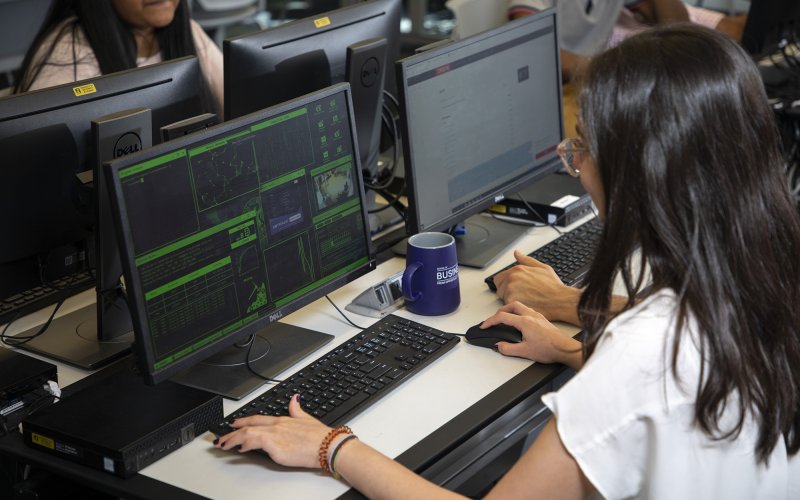School of Business Recognized for Cyber Defense Education

ALBANY, N.Y. (Oct. 19, 2023)— The University at Albany’s School of Business has once again been recognized for significant contributions in cyber defense education.
The School, which launched New York’s first four-year digital forensics program in 2013, has been designated as a National Center of Academic Excellence in Cyber Defense (CAE-CD) through the academic year 2028.
The undergraduate program in digital forensics has been specifically recognized as a Center of Academic Excellence – Cyber Defense Education (CAE-CDE) institution through the National Information Assurance Education Training Program (NIETP). Sponsored by the National Security Agency (NSA) and the Department of Homeland Security (DHS), NIETP operates under national authority as the manager for cyber defense education and training relating to national security systems.

"We’re honored that our digital forensics program has once again been recognized for helping to meet the educational and training needs of the growing cybersecurity field," said Sanjay Goel, professor and chair of Information Security and Digital Forensics. "Since its inception, our nationally recognized program has helped train specialists for positions in forensic technology and science, information technology, systems defense, risk assessment/compliance, eDiscovery, cyber intelligence and many other areas."
In addition to the four-year digital forensics undergraduate program, the School of Business also offers three concentrations in a master’s degree in digital forensics and cybersecurity offered in conjunction with College of Emergency Preparedness, Homeland Security & Cybersecurity, an MBA with a concentration in cybersecurity and a graduate certificate in information security.
"We are honored to be recognized as a national leader in cyber defense education," said Kevin Williams, interim dean of the School of Business. "Our digital forensics program helps address critical workforce needs in areas such as in information security, homeland security, cybersecurity, applied engineering, and law enforcement."
The CAE-CD designation is award to regionally accredited academic institutions offering cybersecurity degrees and/or certificates at the associate, bachelor’s and graduate levels. Institutions must demonstrate that they engage in significant community involvement, academic activities, and institutional practices in cybersecurity, and that the institution has one or more programs of study under consideration meeting the requirements set forth by NSA.
According to NSA, the goal of the NCAE-C program is to promote and support quality academic programs of higher learning that help produce the nation’s cyber workforce.
Goel, who spearheaded the effort for this designation, has garnered substantial funding in cyber security research through federal agencies and foundations, including the National Science Foundation, IARPA, National Institute of Standards and Technology, Dept. of Commerce EDA, and the James S. McDonnell Foundation.
Goel also directs the Center for Forensics Analysis of Complex Energy and Transportation Systems (FACETS), which is the focal point for cyber security research on campus.
The School of Business also maintains a Cybersecurity Lab, a virtually quarantined environment that facilitates research on active malware security and resilience of cyber-physical systems, particularly connected vehicles and Smart Grid. It is equipped with smart meters, traffic signals and software necessary to facilitate cybersecurity research in a safe environment, such as: Understanding of CPS protocols; analysis of CPS security; creation of guidelines, standards and tools for data collection and forensic analysis; real-time systems monitoring; and system resiliency testing against different attacks in a quarantined environment; as well as protocol development for situational awareness of system anomalies, incidents, incident responses, and actionable intelligence.
UAlbany’s digital forensics programs provide critical training in the protection, defense, and investigation of information and systems in industries such as public accounting, IT consulting, government, healthcare, technology, and not-for-profit environments. Students are equipped with technology skills in network, hardware, software, and law applications, and build core competency in the areas of data preservation, examination, and discovery across criminal, accounting, and financial forensics.
The School of Business was first recognized in 2018 as a National Center for Academic Excellence in Cyber Defense research (CAE-R).




